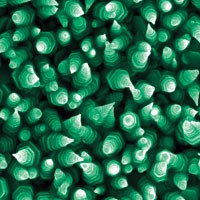Oct 4 2008
As part of a unique collaborative agreement, the Japanese government has located a new research satellite at The Nanoscience Centre, University of Cambridge.
 Image by Dr James Bendall.
Image by Dr James Bendall.
Cambridge is one of four institutes located outside of Japan which will host a satellite of the 'International Center for Materials Nanoarchitectonics' (MANA). (The University of California, Los Angeles, the Georgia Institute of Technology and CNRS, France will host the other three satellites.) Two branches will be located in Japan at Tsukuba University, Tokyo and Hokkaido University, Sapporo.
MANA is expected to create world-class research centres with global visibility and will be implemented under the supervision of a number of top scientists from Japan's National Institute for Materials Science (NIMS). The 10 year, $150M programme is aimed at developing innovative materials that contribute to sustainable development - realising a major shift in materials research.
The Cambridge University satellite will be led jointly by Professor Mark Welland, who heads the Nanoscience Group in the Electrical Engineering Division of Cambridge's Engineering Department, and Dr David Bowler from the London Centre for Nanotechnology and Department of Physics & Astronomy, University College London. It builds directly upon the strong international links developed as part of the Research Council funded Interdisciplinary Research Collaboration in Nanotechnology and provides for a long term platform to substantiate and enhance scientific exchanges with the premier materials laboratory in Japan.
MANA provides priority support for projects aimed at creating top world-level research centres staffed at their core with the world's leading researchers. NIMS is one among five participants selected from Japan to participate in the World Premier International (WPI) Research Centre Initiative.
Professor Masakazu Aono, Director-General, MANA, NIMS, Tsukuba, recently said, "It is critical to the success of this 10 year project that we have leading international partners. Professor Welland's group at Cambridge and Dr Bowler's group at UCL will significantly enhance our work in the area of nanomaterials for a sustainable environment."
Professor Welland, the Principal Investigator of MANA & Co-Director of MANA Satellites said, "It is a huge honour to be part of one of the world premier institutions funded through the Japanese Government. The resources this will bring both directly to Cambridge in collaboration with facilities in Japan will have long term and substantial benefits to our research."
Dr David Bowler added, "Both groups involved in the satellite have long-standing links with NIMS and this project will considerably strengthen them. It also builds on the strong links between UCL and Cambridge which were established by the IRC in Nanotechnology. The close collaborations between experiment and theory, between UCL and Cambridge and between the UK and Japan promise to offer exciting opportunities for new research."